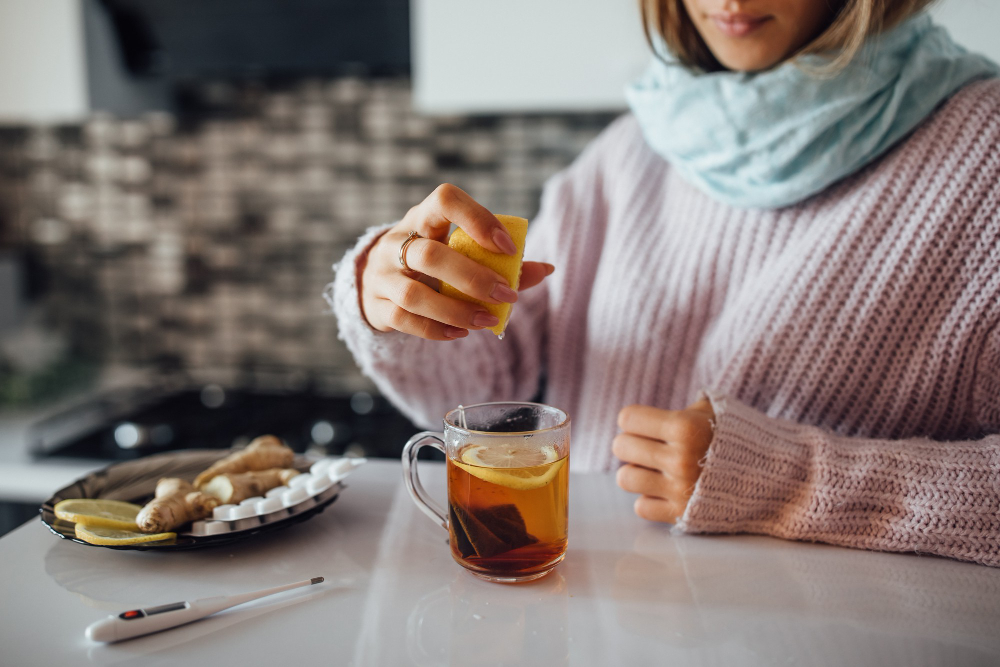As the winter chill sets in, so does the season of sniffles, sore throats, and flu. But before you reach for over-the-counter remedies, consider a natural alternative that’s been used for centuries: ginger tea. Not only does it warm you from the inside out, but it also brings a host of benefits to fight cold and flu symptoms.
The Magic Ingredient: Ginger
Ginger, a root known for its pungent and spicy flavor, is the star ingredient of this healing tea. It’s packed with gingerols and shogaols, compounds that have anti-inflammatory and antioxidant properties, making it an ideal remedy for combating cold and flu symptoms.
Why Ginger Tea for Cold and Flu?
- Natural Decongestant: The warmth of the tea helps loosen congestion, while ginger’s natural properties aid in reducing mucus production.
- Sore Throat Relief: Ginger’s anti-inflammatory properties can soothe a sore or scratchy throat, providing much-needed relief.
- Immune Boosting: Rich in antioxidants, ginger strengthens the immune system, making it more effective in fighting off viruses.
- Fever Reducer: Ginger has natural fever-reducing qualities, making it a gentle alternative to help lower high temperatures.
- Digestive Aid: If your stomach is unsettled, ginger tea can help calm nausea and aid digestion.
How to make the best cup of ginger tea for flu and cold?
Creating this therapeutic beverage is simple and requires only a few ingredients. Here’s how to make ginger tea that not only tastes good but also maximizes its health benefits:
Ingredients:
- 1 inch of fresh ginger root
- 2 cups of water
- Honey (to taste)
- Lemon juice (optional)
Instructions:
- Ginger Preparation: Begin by removing the skin from the ginger root and slicing it into thin pieces.
- These thin slices increase the surface area, allowing more ginger essence to infuse into the water.
- Boil the Water: Place the water in a pot and heat it until it reaches a boiling point. Once boiling, add the ginger slices.
- Simmer: Reduce the heat and let the ginger simmer in the water for about 10-20 minutes, depending on how strong you prefer the flavor.
- Strain and Serve: Remove the pot from heat and strain the tea into a mug to remove the ginger pieces.
- Add Flavors: Sweeten your ginger tea with honey and add a few drops of lemon juice for an extra vitamin C boost and a tangy flavor.
Serving Suggestions:
Enjoy your ginger tea hot for the best results. Drinking it while it’s warm provides immediate comfort and helps in clearing nasal passages. You can also refrigerate the tea and enjoy it cold, but the benefits are most pronounced when it’s warm.
Variations:
- Add a cinnamon stick or a few cloves while simmering for additional flavor and health benefits.
- Mix ginger tea with green tea to create a drink rich in antioxidants.
- If fresh ginger is not available, you can use ginger powder, but the taste and benefits are best with fresh ginger.
Conclusion:
Ginger tea is not just a flavorful drink, but a powerful herbal remedy for cold and flu symptoms. Its natural properties make it an excellent choice for those seeking a holistic approach to health. Embracing this age-old remedy can provide comfort and healing during the cold season.
Remember, while ginger tea is a fantastic home remedy, it’s important to consult with a healthcare professional for serious health issues. Enjoy your ginger tea and stay healthy this winter season!
FAQs
Can Ginger Tea Help With Cold and Flu Symptoms?
Absolutely! Ginger tea is known for its powerful antioxidant and anti-inflammatory benefits. It can help alleviate symptoms like congestion, sore throat, and nausea, making it a comforting remedy during cold and flu season.
How Often Should I Drink Ginger Tea When I’m Feeling Sick?
While ginger tea is a natural remedy, moderation is key. Drinking 2-3 cups a day when you’re feeling under the weather is typically enough to reap its benefits without overdoing it.
Is It Better to Use Fresh Ginger or Powdered Ginger for the Tea?
Fresh ginger is generally preferred for making ginger tea due to its stronger flavor and higher concentration of beneficial compounds. However, if fresh ginger isn’t available, powdered ginger can be a convenient alternative.
Can Children Drink Ginger Tea?
Yes, children can drink ginger tea, but in smaller quantities. It’s advisable to give them a milder version of the tea (less ginger and shorter steeping time) and to ensure they’re comfortable with the spicy taste.
Are there any Potential Adverse Effects of Consuming Ginger Tea?
Ginger tea is safe for most people, but in rare cases, it can cause mild side effects like heartburn, stomach upset, or diarrhea. If you have a history of gallstones or are on blood thinners, consult your doctor before adding ginger tea to your routine.
Can I Add Other Ingredients to My Ginger Tea for Added Benefits?
Definitely! Adding ingredients like lemon, honey, cinnamon, or cloves not only enhances the flavor but also brings additional health benefits. Lemon boosts vitamin C, honey offers soothing properties, and spices like cinnamon add their own unique health advantages.
Must Read: Get Rid of Neck Fat for Women: Effective Strategies and Tips
